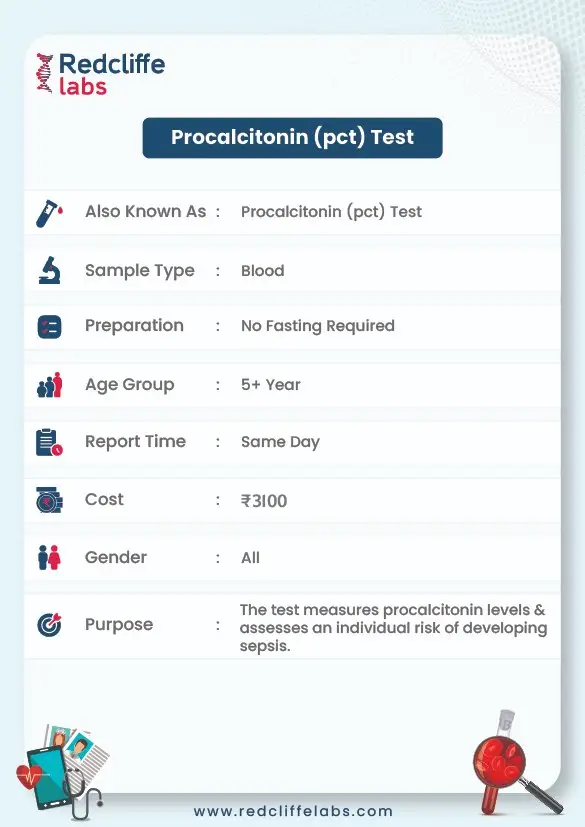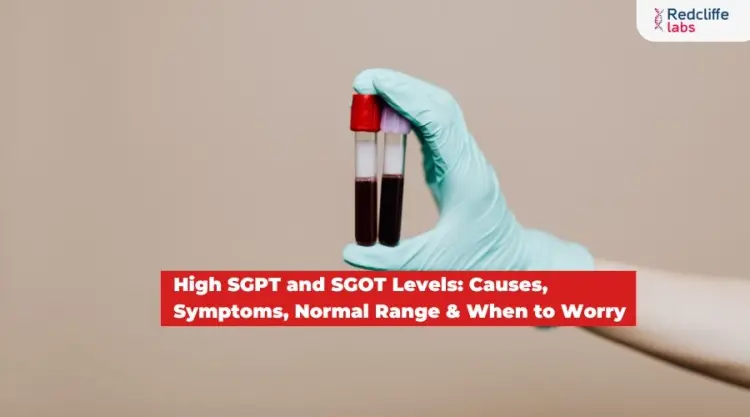Blood
Unlock special
discount on
this package
Login to Unlock 🔓
NABL Accredited lab*

Booking Benefits Unlocked Worth FREE 799

Report Consultation

Diet Plan
*Available once your report is generated.
At Redcliffe Labs, we have a single goal: to give India its right to quality diagnostics.
Customers served
Tests Processed Everyday
Cities
Collection Centres
World Class In-house Labs
Home Collection Experts
1 Test Parameters
Procalcitonin
1 PARAMETER INCLUDED
1 PARAMETER INCLUDED
- Procalcitonin
Top Booked Health Checkup Packages
Reports in 12 hours
|Parameters 94
Reports in 12 hours
|Parameters 89
Reports in 12 hours
|Parameters 96
Reports in 12 hours
|Parameters 96
Reports in 12 hours
|Parameters 90
Verified by Medical Expert

WRITTEN BY
Sheena Mehta

MEDICALLY REVIEWED BY
Dr. Pradeep Lodha
Table of Content
Introduction to PCT blood test
Procalcitonin is a protein produced by your body in response to bacterial infections. The PCT or Procalcitonin test measures the procalcitonin level in your blood. Normally, the prolactin level is low in your blood. When your body contracts with severe bacterial infections, the cells release procalcitonin in your blood and cause PCT levels to rise. This means that high levels of procalcitonin are a sign of bacterial infections, inflammatory conditions, and sepsis. Your doctor may recommend the PCT blood test to detect the risk of developing severe sepsis, allowing for more aggressive treatment plans.
Sepsis or septicemia is a deadly disease that develops when your body responds to an infection. This is caused by bacteria when the infection reaches the blood and triggers body parts like the lungs, skin, urinary tract, or digestive system. It causes inflammation and blood clotting throughout your body. While meant to fight the infection, this extreme response can damage your tissues and organs. If left untreated, sepsis can rapidly lead to organ failure and even death. Fortunately, the PCT test helps to diagnose sepsis early. Moreover, early diagnosis is critical for successful sepsis treatment.
You can choose Redcliffe Labs as your diagnostic health partner for the PCT lab test. The professional here will answer all your queries related to the test and provide a smooth blood testing experience. Don't delay in identifying the condition of Sepsis that may harm you later; book your PCT test today!
Test details in brief
| Also Known As | Procalcitonin (pct) Test |
| Purpose | The test measures procalcitonin levels & assesses an individual risk of developing sepsis. |
| Preparation | Do not take any over-the-counter medicine without confirming with your Doctor. |
| Fasting | No Fasting Required |
| Get Reports | Within 15 hours |
| PCT Test Cost | INR ₹3100 |

Purpose of PCT Blood Test
The primary purpose of the PCT test is to identify viral, bacterial, and sepsis conditions. Here is what the test aids in detecting-
- The PCT blood test helps to identify if someone has sepsis.
- PCT is elevated in response to bacterial infections and identifies the cause of inflammation. This helps distinguish bacteria from viral or other causes.
- Higher PCT levels may indicate a higher risk of severe sepsis, prompting more aggressive treatment plans.
- Identify the signs of kidney infections in children with urinary tract infections.
- It helps healthcare providers to decide what treatment works best for them.
What does the PCT blood test detect?
The Procalcitonin (PCT) blood test detects and evaluates bacterial infections and their severity. It helps differentiate bacterial infections from viral or non-infectious causes of inflammation.
- Procalcitonin is a substance produced by many types of cells in the body, often in response to bacterial infections and tissue injury.
- Procalcitonin levels increase in systemic bacterial infections and sepsis. The test measures the level of procalcitonin in the blood.
- The test identifies bacterial infections in the body and determines whether antibiotics are necessary, especially in respiratory or urinary tract infections.
- The test helps to evaluate the extent and severity of bacterial infections. Higher PCT levels indicate more severe infections, such as widespread bacteremia or septic shock.
- Tracks the effectiveness of antibiotic therapy. Declining PCT levels indicate successful treatment, while persistent elevation suggests unresolved infection.
The PCT Test detects the conditions like-
- Sepsis and Septic Shock
- Severe Respiratory Infections (e.g., bacterial pneumonia)
- Urinary Tract Infections (UTIs)
- Post-Surgical Infections
- Abdominal Infections (e.g., appendicitis, peritonitis)
- Bone and Joint Infections (e.g., osteomyelitis)
- Neonatal Sepsis
When is a PCT Blood Test needed?
A procalcitonin test may be needed when a patient is critically ill and has symptoms and indications of sepsis, a severe bacterial infection, or both. It may also be required when a person gets an infection, such as meningitis or pneumonia, and the cause is unknown.
- Procalcitonin levels can be useful in monitoring patients with sepsis, a potentially life-threatening condition resulting from the body's extreme response to an infection.
- It helps to detect systemic bacterial infections that may lead to sepsis. To monitor the severity of sepsis and guide treatment.
- To determine if an infection is bacterial or viral.
- PCT levels can help to distinguish between bacterial and viral causes of respiratory infections, guiding appropriate antibiotic usage.
- This study aims to evaluate bacterial respiratory tract infections, such as pneumonia, and decide whether antibiotics are necessary for lower respiratory tract infections.
- To check for secondary bacterial infections in patients recovering from surgery or trauma.
- To assess the response to antibiotic therapy in infections like sepsis or pneumonia.
- In patients with fever and a compromised immune system, such as those undergoing chemotherapy or organ transplantation. In newborns with suspected neonatal sepsis.
Preparation of PCT Blood Test
The PCT blood test is simple. Here is what to expect during the PCT blood test-
- Fasting- The PCT test does not require fasting. You can eat and drink as usual before the test.
- Inform your doctor- Inform your doctor about any medications and supplements you are taking, as these might impact your test results.
- Consult your doctor- If you have concerns about the PCT test, ask your doctor.
The Procedure of the PCT Blood Test
The PCT blood test procedure is similar to other blood tests in which the healthcare provider will collect the blood sample from the vein. Let’s understand the PCT blood test procedure in detail below-
- The healthcare professional will locate a vein in your arm. They might use a tourniquet to make the vein more clear.
- After that, he will insert a vein into the vein. You might feel a slight prick or sting during the procedure.
- Next, the phlebotomist will collect the blood sample into a vial.
- After sample collection, the needle will be removed, and a bandage will be applied to a puncture site to stop bleeding.
- The complete PCT test procedure will only take less than 5 minutes.
- The blood sample will be sent to the laboratory for analysis. The test results will be available within 24 hours of sample collection.
What do the PCT blood test reports indicate?
The PCT blood test reports will show the procalcitonin level in your blood. The PCT test reports will be provided within 24 hours of sample collection. Consult your reports with your doctor; based on your symptoms and medical history, the healthcare provider will interpret the test results-
- Normal levels- The normal procalcitonin level is between 0.5 ng/ml and 2 ng/ml. This suggests no risk of sepsis and bacterial infection.
- Low level—The low level of procalcitonin suggests that the symptoms are due to other bacterial or viral infections.
- High level- The high level of PCT is greater than 2ng/ml, which indicates a high risk of sepsis. High levels have also been seen in people with serious bacterial infections, such as meningitis.
- Moderate levels-The moderate level results are inconclusive. It might indicate bacterial infection; other factors might also cause a rise in PCT levels. Doctors might consider other tests and symptoms alongside the PCT result for diagnosis. They may also be seen in children with kidney infections.
What does the low proclamation result mean?
Low levels of procalcitonin tell you that you are at low risk of developing sepsis, but you have:
- < 0.1 ng/mL: Indicates a very low likelihood of a significant bacterial infection or sepsis.
- A local bacterial infection, for example, a urinary tract infection.
- It is likely associated with viral infections, mild inflammatory conditions, or a healthy state.
- Symptoms of the beginning of a systemic bacterial infection.
What does the high proclamation result mean?
Moderate to mildly high levels of procalcitonin level in the blood indicate-
- Early signs of a systemic bacterial infection
- Any condition other than a bacterial infection that can include but is not limited to tissue damage caused by trauma, a recent surgery, severe heart attack, or serious burns.
- In children, these levels may indicate a kidney infection.
PCT Blood Test Normal Range
| Procalcitonin Level (ng/mL) | Interpretation |
| < 0.05 ng/mL | Normal; no significant infection detected. |
| 0.05 - 0.1 ng/mL | Low risk of bacterial infection or sepsis. |
| 0.1 - 0.5 ng/mL | Moderate risk; infection may be present. |
| > 0.5 ng/mL | High risk of bacterial infection or sepsis; requires further evaluation. |
| > 2 ng/mL | Strong indication of severe bacterial infection or sepsis. |
What types of infections can lead to sepsis?
The infections that most commonly lead to sepsis are those of the lung (pneumonia), urinary tract, skin, and digestive tract. Common bacteria that can trigger sepsis include Staphylococcus aureus, skin and soft tissue infections, bone and joint infections, Gastrointestinal Infections, Escherichia coli (E. coli), and some types of Streptococcus.
Who is at high risk of Sepsis?
Sepsis can strike anyone; certain groups are at higher risk due to weakened immune systems or increased vulnerability to infection. Here are certain categories of people who are at higher risk of sepsis, including-
- Newborns, Infants - The immature immune system makes them more susceptible to infections.
- Older adults: As people age, their immune systems start weakening, increasing the risk of infections and complications like sepsis.
- Post-surgery patients- Surgical procedures could create entry points for bacteria, and the postoperative recovery phase can suppress the immune system.
- People with internal medical devices like catheters- Catheters, implants, and other devices can harbor bacteria, increase the risk of infection, and progress to sepsis.
- People with chronic conditions like diabetes- People with diabetes, chronic lung disease, kidney disease, and other chronic conditions have compromised immune systems, making them more susceptible to infections and sepsis.
- People with weakened immunity- People with HIV/AIDS, undergoing chemotherapy, or taking immunosuppressant medications have weakened immune systems, putting them at higher risk of severe infections and sepsis.
Who should take the PCT blood test?
Your doctor will recommend the procalcitonin test if you are experiencing bacterial infection or sepsis symptoms. Consult your doctor if you are experiencing these symptoms-
- Fever
- Chills
- Rapid breathing
- Confusion
- Low blood pressure
- Rapid heartbeat
- Sweaty Skin
- Fever or chills
- Extreme pain
The doctor may recommend the test to determine if a person has pneumonia or meningitis and to know the cause, whether it is bacterial or non-bacterial. The doctor may recommend the test to the child to diagnose the signs and symptoms of urinary tract infection. The test may usually be ordered for people having a history of tissue damage from trauma, surgery, a burn, or a viral illness such as pneumonia.
PCT Blood test price at Redcliffe Labs
The PCT blood cost price at Redcliffe Labs is INR 3100. You can download the Redcliffe Labs app from the Google Play Store and book your PCT test appointment online. The app interface is smooth and easy, and booking the test will not take more than a minute. We promise to provide accurate test results within 11 hours of sample collection. Book your PCT test with us and choose the convenient option, especially if you're not feeling well enough to visit a lab.
Moreover, our labs are NABL accredited and ISO certified, so don't worry about the quality and reliability of the test results. We also offer a home sample collection. So what are you waiting for? Book your PCT test today!

PCT Test Cost in Different Cities - Redcliffe Labs
| City Name | Discounted Price |
| Delhi | ₹3100 |
| Ahmedabad | ₹3100 |
| Mumbai | ₹3100 |
| Bangalore | ₹3100 |
| Noida | ₹3100 |
| Pune | ₹3100 |
| Lucknow | ₹3100 |
| Hyderabad | ₹3100 |
| Chennai | ₹3100 |
| Gurgaon | ₹3100 |
| Jaipur | ₹3100 |
| Faridabad | ₹3100 |
| Indore | ₹3100 |
| Patna | ₹3100 |
Note: We also offer PCT Test PAN India. Please call the number 8988988787 to check the availability of services in your area.
What causes High Procalcitonin?
Very high PCT levels are most commonly found in severe bacterial infections. These could include pneumonia, urinary tract infections, meningitis, or even sepsis, a life-threatening response to infection.
Although the PCT test isn't used to diagnose or monitor this specific cancer, very high levels can sometimes be a sign of medullary thyroid carcinoma. However, this is a less frequent cause compared to bacterial infections.
The PCT test can't identify the specific type of bacteria causing the infection. Additional tests like blood cultures are needed to determine the culprit and guide targeted antibiotic therapy. High PCT results require expert interpretation by a healthcare professional. Your doctor will use the PCT result, other tests, and your medical history to determine the cause of your disease and recommend the most appropriate treatment plan.
Don't Wait: Early Detection of Sepsis with the PCT Blood Test
Sepsis is a medical emergency that requires early attention. However, recognizing the signs and symptoms early and seeking immediate medical attention can help in successful treatment and preventing complications. PCT blood tests can help early detect systemic bacterial infections, including bacterial pneumonia and bacterial meningitis, and prevent life-threatening diseases.
Furthermore, if you fall into one of the high-risk categories, discuss your concerns with your doctor. They can advise you on preventive measures, such as good hygiene practices, proper care of medical devices, and maintaining a healthy lifestyle to strengthen your immune system. Sepsis is a time-sensitive condition. If you or someone you know experiences symptoms like fever, chills, rapid breathing, confusion, or extreme discomfort, seek medical attention immediately. Take the PCT test as soon as you recognize the symptoms. Choose Redcliffe Labs as your trusted diagnostic partner to take PCT tests and take charge of your health today!
5 Simple Steps to Manage Your Health with Redcliffe Labs
Quick, Simple & Convenient; trusted care delivered to your doorstep.

Start Your Online Booking
Open the Redcliffe Labs website/app. Select the test or package and enter your details. Schedule the service for your preferred slot.

Live Tracking
Stay updated with real-time tracking for a smooth and timely home sample collection.

Sample Collection
Our certified experts ensure a smooth, hygienic, and fully compliant sample collection experience.

Doctor-Verified Smart Reports
Every report is clinically checked by expert doctors and shared with smart, actionable insights.

Your Health Journey Continues Post Reports
Consult with our expert medical team to get actionable insights to improve your health.
Nearby Labs(9)
Redcliffe Labs Noida

MC-5280
Redcliffe Collection Center
Redcliffe Collection Center
Redcliffe Collection Center
Redcliffe Collection Center
Redcliffe Collection Center
Redcliffe Collection Center
Redcliffe Collection Center
Redcliffe Collection Center
Frequently Asked Questions
What is a PCT blood test?
What is a PCT test for the kidney?
What is the PCT test's normal range?
When is the PCT test done?
What is the cost of a PCT-level test?
Who should get a PCT blood test?
What are the symptoms of high procalcitonin?
Is there any special preparation required for the PCT test?
Can I book a Procalcitonin (pct) Test near me?
Can I book a home collection for a Procalcitonin (pct) Test?
Health Articles & Blogs
My Health
Stay informed with our expert health articles and blogs. Explore comprehensive guides on diseases, nutrition, preventive care, and wellness tips to help you make better health decisions.
Migraine Treatment at Home: Effective Ways to Relieve Migraines Naturally

High SGPT and SGOT Levels: Causes, Symptoms, Normal Range & When to Worry

Brain Hemorrhage Symptoms: Early Warning Signs, Types, Causes & When to Seek Emergency Care

What is SGPT in Blood Reports? Everything You Need to Know

Capsicum (Shimla Mirch) 101: Benefits, Nutritional Value, Uses and More

Normal Calcium Levels: Range, Symptoms & Causes of Imbalance

Home Remedies to Get Rid of Cold in Babies: Safe & Natural Relief for Infants
Discover safe home remedies to get rid of cold in babies. Learn natural and gentle relief methods to ease cough, congestion, and cold symptoms in infants.

How Often Should You Get a Full Body Health Checkup?
Explore My Health
